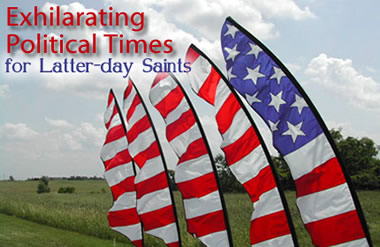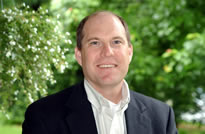

By Geoffrey Biddulph
Editor’s Note: Although Geoffrey Biddulph works in Church public affairs in South Florida, he stresses that the views expressed here are his own.
The 2004 election results offer the exhilarating possibility that Latter-day Saint politicians and the Church’s beliefs and values may become much more prominent – and potentially more controversial – in the coming years.
As I watched the results from the elections Tuesday night and Wednesday morning, I was overcome by feelings that I was observing directly the Lord’s hand at work. Quietly but firmly, political chess pieces are being moved to make the Church more well-known, and perhaps even central, to the U.S. democratic process.
Consider:
- The reelection of Nevada Sen. Harry Reid, who is LDS, makes him one of the most prominent Democratic politicians. Why? Senate minority leader Tom Daschle lost his senate race in South Dakota, and Sen. Reid is widely expected to take his place. The Senate minority leader is often seen as the spokesperson for the political party that is not in power. Expect Senator Reid to spend a lot more time in front of cameras in the coming years if he takes that post.
- Ballot measures opposing same-sex marriage were approved in 11 states, including the relatively liberal state of Oregon. In some states, the local press mentioned that the LDS Church was among the prominent supporters of a traditional definition of marriage. It is no accident that the Church came out with two statements supporting traditional marriage this year – it is a crucial time in the fight for protecting the family, and the Church’s role is increasingly important.
- Mitt Romney, the Republican governor of Massachusetts (and a member of the Church), is still being talked about as a dark horse candidate for president in 2008. President Bush’s reelection makes a possible Romney bid more likely under some political scenarios. Right now, the race for Republican presidential candidate in 2008 is wide open. A Republican who can win and remain popular in a liberal state like Massachusetts might be just what the GOP needs to win another four years in the presidency. Don’t forget that Massachusetts is right next door to the crucial state of New Hampshire, site of the first primary of the 2008 political season. Much of New Hampshire watches Boston TV stations, so Romney will be very well-known there by 2008. In addition, Romney has made at least one trip to the crucial state of Iowa, site of the Iowa caucuses.
- The widespread rejection of the Democrats, who have been pushed farther into the minority than anytime since at least the 1920s, is seen by many analysts as a direct result of the party’s alliance with the secular humanist and anti-religious wings of the “progressive” movement. County by county, results show that the Democrats were completely rejected in the South and in rural areas countrywide. In most cases, there is a direct correlation between the religious fervor of voters and their rejection of Democrats: the more they go to church, the more they vote Republican. The also applies to Hispanics and African-Americans – groups that voted in much greater numbers for the President and his party this year than they did in 2000. This identification between religiosity and voting preferences makes the fast-growing LDS Church an increasingly important player in political scenarios for years to come.
- The political representation of the Church is already proportionally larger than its population in the United States. There are five LDS senators – Reid, Republican Gordon Smith in Oregon, Republicans Hatch and Bennett in Utah, and Republican Mike Crapo in Idaho – and at least 12 Mormon Congressmen, in addition to two Mormon governors. LDS candidates appear to be more electable in many cases because they have fewer skeletons in their closets (such as drunk driving arrests). It is interesting to note that in the space of 110 years, Mormons have gone from complete social outcasts, harassed and distressed by the U.S. government, to model political candidates.
All of these trends make for fascinating theater for Latter-day Saints. In what direction will the Mormon Sen. Reid try to push the Democratic Party? Will he try to bring it more toward the mainstream, especially on moral and religious issues?
Meanwhile, will Gov. Romney continue to visit Iowa and position himself for a presidential run? What about 2009 – a Republican President Romney opposed at every turn by a Democratic Minority leader Sen. Reid? Two Mormons duking it out in Washington – now that would be interesting.
I must admit that the prominence of so many LDS politicians also makes me a bit nervous. I can imagine scenarios where sacred things – such as the temple – are dragged through the mud by an increasingly secular mainstream media. One small example: during the Salt Lake City Olympics, The Washington Post printed a snarky and unprofessional article speculating about why Mormons wear garments. I would expect a lot more of that. In addition, the Church’s position on same-sex marriage – and the history of polygamy and blacks and the priesthood – will likely be political fodder. There is a great danger that the Church’s history and its positions will be distorted by the mainstream media, which simply does not have many journalists who understand religious issues.
The Lord has prepared us for these events, however. Compared to our early history of being mobbed and harassed, these are the best of times. It’s going to be amazing.
Geoffrey Biddulph is the author of a new novel called Island of the Innocent , an adventure story that describes one man’s conversion to the fullness of the gospel.

















